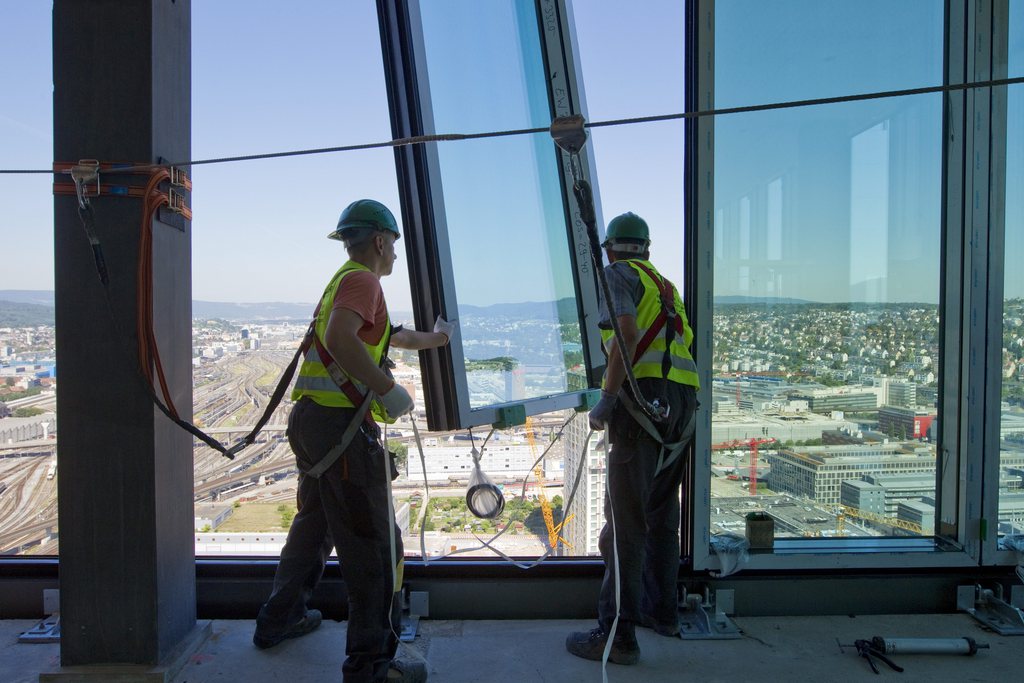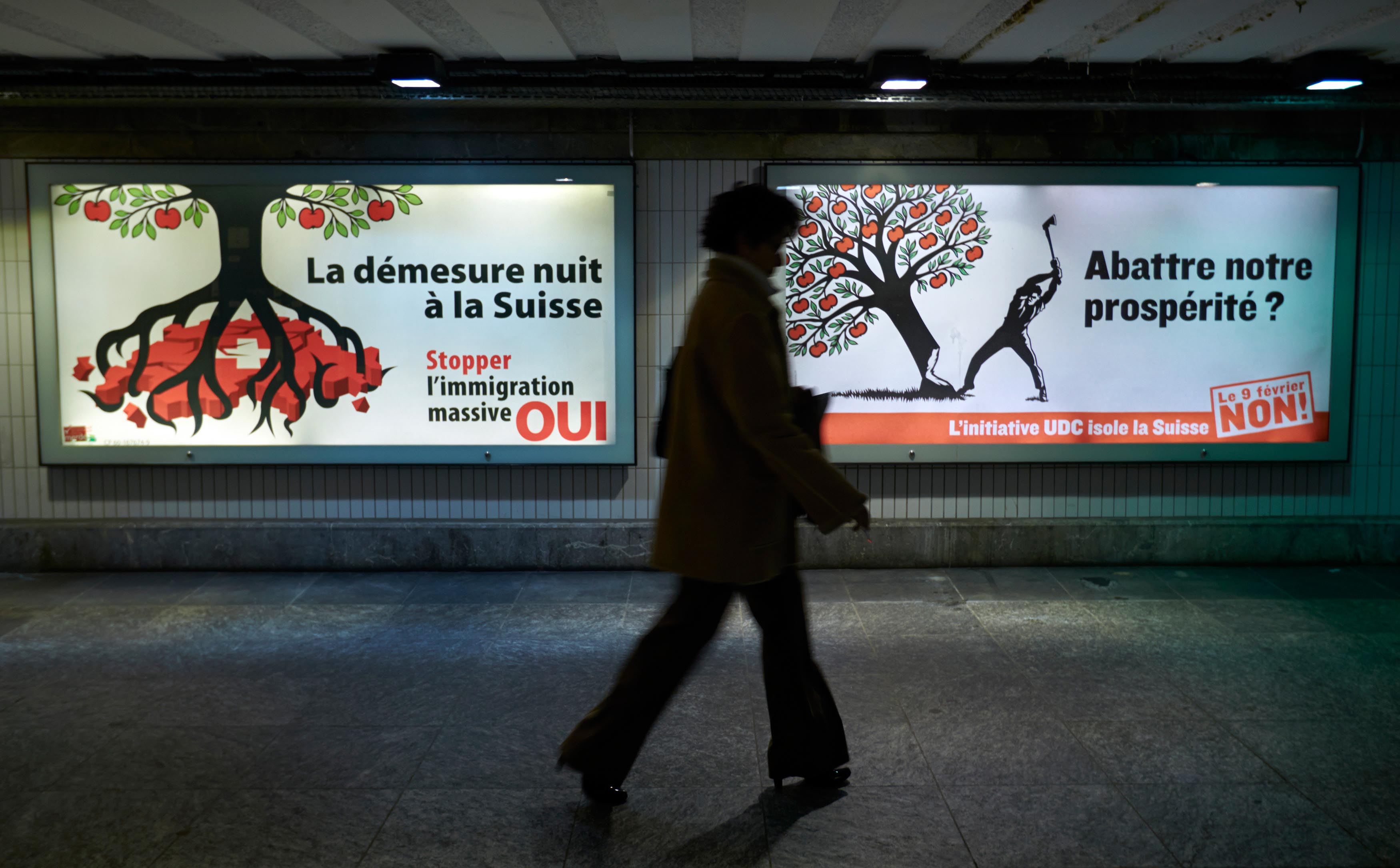Jobs fears sparked by immigration vote

Tens of thousands of jobs could be lost to the Swiss economy following Sunday’s decision to restrict the flood of European Union workers. The warning comes from both trade unions and economists assessing the possible fallout of the vote.
The Trade Union Federation fears a major hit to the workforce if the EU retaliates by tearing up other bilateral agreements.
Credit Suisse bank estimates 80,000 fewer jobs will be created in the next three years as the “poison” of uncertainty forces firms to put the brakes on investment in Switzerland. The bank says that is half the number of jobs that would normally be created in the economy in this timeframe.
Sunday’s vote now gives the Swiss government three years to implement as yet unknown measures to halt the tide of foreign workers from the EU.
Businesses simply do not like to invest if they cannot be sure of the future, Credit Suisse head of economic research, Oliver Adler, told swissinfo.ch. “Companies that are considering expansion or launching new products in Switzerland will have to reconsider whether they go ahead, move the project abroad or simply delay their plans,” he said.
Total workforce: 4.85 million
Swiss nationals: 3.41 million
Foreigners: 1.44 million
(source: Federal Office for Statistics, 3rd quarter 2013)
The Trade Union Federation has warned of “dire consequences” to the Swiss export industry of possible EU reprisals, with “tens of thousands of positions at risk”. The EU is Switzerland’s largest trading partner, accounting for 56% of all Swiss exports in 2012.
“One of the most important bilateral agreements, now at risk, allows Swiss companies to trade in across every EU member state,” Daniel Lampart, federation secretary-general, told swissinfo.ch. “Without the treaty, companies would have to apply to trade in each country individually.”
The federation also argued that the vote is no way to combat the mass influx of cheap EU labour forcing down wages in Switzerland. Instead, a more robust enforcement of existing measures to protect wages should be complemented with a minimum wage.
Pascal Brenneisen, head of Novartis Switzerland
What is crucial now is the way in which the quota system is implemented.
“Scaremongering”
However, the rightwing People’s Party that brought the issue of immigration to the voting booths dismissed such arguments as “scaremongering” by people who are out of touch with the population.
“They remind me of the same arguments that were used when Switzerland rejected membership to the European Economic Area in 1992,” Hans Kaufmann, People’s Party economics spokesman, told swissinfo.ch. Since that time, Switzerland’s trade position with the EU has actually strengthened, he added.
“It would also hurt the EU if they scrap other bilateral treaties in response to this vote,” Kaufmann said, pointing particularly to a deal on overland transport that allows EU freight to be transported by truck through the Swiss Alps.
However, many of the fears are based on the size of Switzerland’s foreign workforce.
A quarter of the workforce of Switzerland’s 300 banks hail from the EU, while around 45% of staff in the Swiss pharmaceutical, chemical and biotech industries are foreign.
The Swiss Bankers Association (SBA) said in a statement that it “fears that the available pool of trained staff will decrease now; it could become harder for banks to supply their needs for well-trained staff.”

More
Bad for business
Possible solutions
Valentin Vogt, head of the Swiss Employer’s Association, warned that this supply of highly skilled workers to Switzerland could dry up.
“Who would come to a country that says: in September we will have quotas for you?” he told the Neue Zurcher Zeitung newspaper. “On top of that, you have to come alone, your family might be able to follow you in two years. I wouldn’t come to Switzerland in those circumstances.”
Swiss pharmaceutical giant Novartis stated that “the success of [the company] is substantially built on the availability of a qualified workforce”.
“What is crucial now is the way in which the quota system is implemented and the need to avoid subsequent damage to the bilateral agreements as far as possible,” added Pascal Brenneisen, head of Novartis Switzerland.
“We shall…do our utmost to achieve a generous interpretation to limit the damage to Switzerland as a centre for business.”
Switzerland has so far negotiated 16 main bilateral treaties with the European Union that complement other deals such as the 1972 free trade agreement.
The treaty concerning the free movement of EU workers was concluded in 1999 along with six other agreements.
The package of deals contained a so-called ‘guillotine clause’ that could rule all treaties null and void if just one is compromised.
These treaties now at risk cover a variety of sectors, from agriculture to transport, research and the trade of goods.
One treaty allows Swiss exporters to trade across all EU member states, doing away with the time consuming and expensive task of applying for export permits in every individual country.
Another allows Swiss firms to pitch for large scale procurement contracts with the same ease as EU –based enterprises.
The agriculture treaty also directly affects trade by reducing tariffs for a range of goods including cheese, fruit, vegetables, meat and wine.
A civil aviation treaty allows a level playing field for Swiss airlines operating commercially in the EU.
Possible measures suggested by Kaufmann of the People’s Party include a quota auction that would allow companies to compete for a restricted pot of foreign workers each year. Another idea would be to introduce a points system that would only allow through foreigners with high enough qualifications and work experience.
Creating a separate social insurance system for transitory workers could relieve the burden of supporting unemployed foreigners, Kaufmann added.
Restoring reputation
The Swiss Business Federation, economiesuisse, hopes that any new measures introduced by the government will cause no further harm to the economy than an increase in red-tape and paperwork.
But Switzerland must now repair the damage to its reputation as a place to do business, according to the lobby group.
“It sends out a bad signal to the international business community,” its chief economist Rudolf Minsch told swissinfo.ch. “It is now absolutely mandatory that we protect Switzerland’s image as a business friendly environment.”
At its annual meeting last August, the federation lamented a whole series of potentially damaging votes that have been queuing up since the beginning of 2013. In addition to Sunday’s limit on immigration, these initiatives included two ballots last year to curb executive pay and a forthcoming vote in May on the minimum wage.
A date has yet been set for another vote on foreigner curbs (the so-called Ecopop initiative) that demands annual migrant numbers to be restricted to no more than 0.2% of the population.

In compliance with the JTI standards
More: SWI swissinfo.ch certified by the Journalism Trust Initiative











You can find an overview of ongoing debates with our journalists here . Please join us!
If you want to start a conversation about a topic raised in this article or want to report factual errors, email us at english@swissinfo.ch.